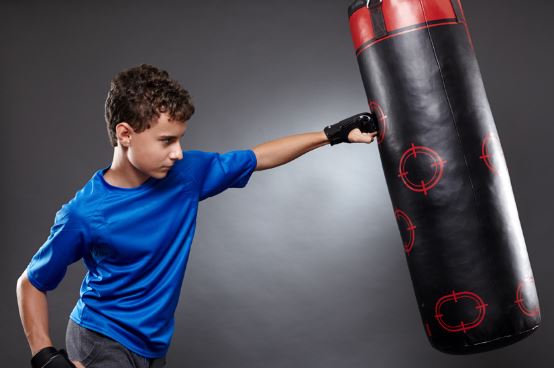You might have seen a YouTube video of an adorable little boy watching the training montage in Rocky and ‘exercising’ along with him. Or the little girl watching Olympic gymnasts and mimicking their moves. There’s even one of a little boy repeating martial arts moves, from kicks and punches to an adorable ‘back-flip’. These kids look 2 or 3 years old. Their motor movements are awkward and wobbly, but they’re having the time of their lives. They have something they’ll probably lose as they get older – an enthusiasm borne by a lack of self-consciousness. They’re fully in their bodies and completely in the moment.
This is the best way to exercise, but we shed those feelings as we get older, replacing them with far less helpful habits. We start to look at our fellow gym-goers, comparing ourselves to them in ways that guarantee we’ll fall short. We get distracted by things that are less work and more fun, eventually dropping our routines. The type of person that works out consistently has built it into a habit. They exercise in the same way we take a shower or brush our teeth – it’s not something they’d think of skipping.
Tantrumming toddler energy
One way to build this habit is to start early. By getting kids into sports while they’re young, it becomes a normal part of their day. So even when it becomes boring or uncool, they’ll probably stick with it. Worst case scenario, they’ll be so hooked on sport that even if they have to quit, they’ll replace it with a different activity. Maybe a young boxing club member will graduate into kick-boxing, Muaythai, capoeira, or kravmaga, which might be more acceptable to their peers. And as long as they’re exercising in the right crowd, that’s fine.
The age they should begin really depends on your kids. Watch them, and take cues from them. Your kids – at least while they’re little – will do the same things you do. Taking your kids to the gym with you can be a strain. Not many gyms are kid-friendly. You can’t watch them because you’re working out yourself, and there’s a risk they’ll get in the way of other gym-goers, or hurt themselves on gym equipment. Your gym time is sacred, but you might consider shifting some of your work-outs to the house.
Install a small home gym with the basics – weights, jump rope, resistance bands – minor, affordable bits of equipment. You don’t need a lot of space – you could even keep them in the garage and bring them onto the driveway or porch once a week, when you want to exercise. Get kiddie versions of your work-out gear and see if your children take an interest. It will give you an idea of what sport attracts them. They can also exercise using toys like hula hoops or roller blades. Avail these tools as soon as your child gets curious about them.
Building up their limbs
Realistically speaking, a child can join a sport as soon as they can walk and talk. They need the capacity to understand instructions and communicate discomfort. Beyond that, it’s really about picking the right sport. This is a combination of ability and interest. So, for example, a toddler that’s particularly adept at their play-group jungle gym could be a budding gymnast. Pass by the local gym and see if any activities catch their eye. The trainer can also assess them casually and see if there’s any talent there. Start the sport – any sport – in a light, low-pressure manner, then see if your kids want to get serious about it.
Because they’re small and easily distracted, pick sports that aren’t too rigorous, at least to begin with. For example, a toddler’s boxing training will mainly consist of punching things and developing balance, so it may emphasise cardio and stance over technique. With time, they can get into the intricacies of it. Another interesting facet is inbuilt reflex. For instance, one of our biggest fears is infants drowning in an uncovered pool. But as another viral video of swimming babies shows, they can instinctively float from a very young age.
We don’t advocate tossing your babies in the pool, but you can begin to swim with them right from day one (think water birth). If swimming is important to your family, begin with inflatables to avoid ‘accidents’. Then graduate to the baby pool and proper pool once they’re potty trained. As with any other sport, the sooner they begin, the more effortless it will be. And by the time they get bored (or peer-pressured) out of it, they’ll already have acquired the mental and physical discipline required to succeed at sport … and life.
Read Also:
